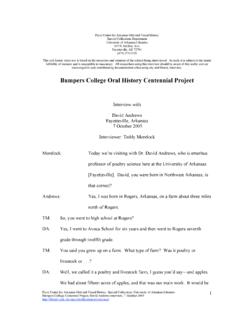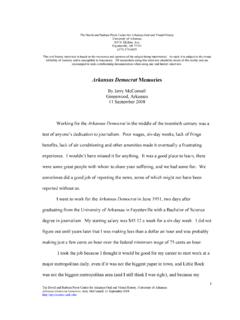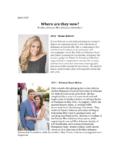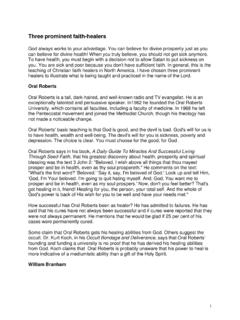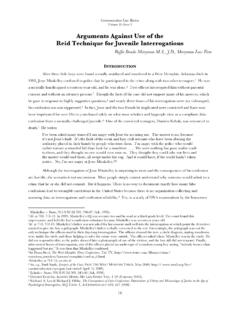Transcription of Gazette Project Interview with - Pryor Center for …
1 1 Gazette ProjectInterview withJames O. Powell,Little Rock, arkansas , 3 February 2000 Interviewer: Ernie DumasErnie Dumas: This is February Powell: :And I m Ernie Dumas. And we re talking to James O. Powell, Jim Powell, whowas the editor of the editorial page of the arkansas Gazette , from 1960 until 198 ..JP:Well, actually, it was :1985. And subsequent senior editor and columnist for the arkansas :Couple of years ..ED:Jim, first I have to explain to you briefly that this is for the arkansas Center forOral and Visual History. And we need your permission to tape this interviewwith the understanding that your remarks can be used for research and whateverother purposes. It becomes a kind of a public :You consent to :All :All right. Let s start with your war record, I guess. You were born in Andalusia,Alabama. 2 :And, went to University of :I went to the public schools in Andalusia.
2 And went to and graduated from theUniversity of Florida, although there were two lapses. My sophomore year Itransferred to the University of Alabama for one year, then returned to Florida formy junior year. Then, before my senior year, I laid out and worked for a year,first on the Alabama Journal in Montgomery and then on the old Columbus,Georgia, Free Press. I returned to Florida for my senior year and graduated witha J., one jump ahead of the draft :Did you go to the Tampa Tribune right after that? Was that your first job?JP:No, the first job after that, when I came back from the Great War [laughs], when Icame back from the Great War, I went back to work on the Alabama Journal inMontgomery, where I had worked the year I was not in college. I went back therein 1946, and worked there in Montgomery about six months, and then I went offto Cuba, just knocking around, and came back and went to work for the TampaTribune late in :What did you do for the Tampa Tribune?
3 State capital reporter for awhile?JP:I started as a city beat reporter. And then they sent me off to open theSarasota/Bradenton Bureau --- you know the grand language we use. I wentdown to cover Sarasota and Bradenton for the Tampa Tribune, and they called mea Bureau. You know how the system has always worked. And I worked there acouple of years, and then Red Newton, who was a flamboyant and fairly3celebrated managing editor of the Tampa Tribune, sent me to Tallahassee, to openthe first capital bureau of a major newspaper in Florida, as distinguished from theAssociated Press. Where I got notorious was in investigative reporting inTallahassee covering the State Capitol. ED:How long did you cover the Capitol?JP:I covered the Capitol, oh, I guess five or six years, and then for about six months Iwent to the Miami Herald, which lured me in for a little more money. In thosedays, you would jump jobs for just a small :Ten dollars a week?
4 JP:Ten dollars a week, you d leave town. Well, I didn t have to leave , you would jump jobs for very little money in those years, as you mightrecall, although you came along later. Anyway, I worked for the Miami Herald,covering the state capitol, about six months, and then I did about a year withGeorge Smathers, as his administrative assistant. George Smathers was one ofthe United States senators from Florida, at the time. I did about a year with himin Washington, and then I had an opportunity to go back to the Tribune as aneditorial writer, and did because I wasn t really comfortable with the transitionfrom journalism to politics. At the time, it was a little too strenuous for :And that would have been in about what year, when you went to the editorialpage?JP:I went to the editorial page in :OK. So, you wrote editorials for the Tampa Tribune for about three years or , well late 1959, I suppose, is when Harry Ashmore, celebrated editor of theGazette, left and became editor of Encyclopedia Britannica, or whereverAshmore went, when he left the Gazette .
5 :How did you come to be the editor of the editorial page of the Gazette ? Did J. N. Heiskell contact you? Did they advertise it? How did you get together?JP:Well, in those years, newspapers didn t go through all the razzmatazz they gothrough now, having tests, advertising and all that business. I really think that sextreme. In those days, it was very informal. There were two things involved, Isuppose --- about three things. The key factor was that Heiskell waswintering in Sarasota. This was after I had left Sarasota as a newspaper reporter,and I was in Tampa as an editorial writer with James A. Clendinen, who was apretty famous editorial editor --- editor of the editorial page, and later editorialdirector of the Tampa Tribune. At the time, I was writing editorials and becameassociate editor with Clendinen on the Tribune, when Mr. Heiskell was winteringin Sarasota.
6 At that time, I believe, Mr. Heiskell had learned that Harry wasleaving --- or subsequently learned that. Anyway, he had read the Tampa Tribuneeditorial page and liked the editorials. So, when Harry made his decision toleave, and, of course, I m not privy to all that, when he made his decision toleave, Mr. Heiskell was the reference for me and my work on the Tampa Tribune,which set the whole business off. The first I knew about it was that one day,Hugh Patterson was on the telephone and wanted to talk to me about coming to5the Gazette as editor of the editorial page. I m not sure if it had been announcedor not, the impending departure of Ashmore. So he wanted to talk to me aboutdoing that. I hemmed and hawed some about it. But quite soon after that, hecame to Tampa and we had lunch at the famous Columbia restaurant in Tampa,and visited at my house for awhile. Pretty soon after that, they asked me to visit Little Rock with the Heiskells and the Pattersons, Harry Ashmore and Jerry offered me the job and I took it.
7 I went to work November 1, 1959, Ibelieve, or it might have been October 1st. It was in October or November of1959. In any case, that was the way it developed. I remember that it was anextremely difficult decision because I was really pretty happy at Tampa. Florida,of course, is a very difficult state to leave, and I had graduated from theUniversity of Florida. Except for my very young years in Alabama, my wholeassociation was with Florida, the University and the Florida newspapers. So, itwas a very difficult decision. After I came out to visit in Little Rock, theyoffered me the job, and subsequently by telephone, they offered it formally, and Iaccepted it formally. One afternoon afterward, I went out in my backyard atTampa, and we had a gorgeous hibiscus tree growing, and it was in full bloom. Ilived not far from Tampa Bay, Bay Shore Boulevard, a gorgeous drive.
8 I got toregretting the move, and I sent word to Little Rock that I couldn t come. Well,Hugh called up, and I softened and came. ED:Well, did you talk mainly to Hugh, or to Heiskell about it? JP:It was initially Mr. Heiskell s interest in the Tampa Tribune, and me as one of the6editorial writers that set it off. But, all the conversation and negotiations, exceptfor my visit with the whole group in Little Rock, were with :What did they ask you? Did they ask you about your philosophy, and whether itwould match those of Mr. Heiskell and Mr. Patterson and Mr. Ashmore?JP:Not much, not much. I don t remember much along that line. Now, I did learn,subsequently, that Ashmore had called my old colleagues at the capitol presscorps at Tallahassee and talked to them about me and my work, where I had donethe most important work I did in Florida --- well, certainly the work that attractedthe most attention was as an investigative reporter in Tallahassee.
9 In any case, itwas Hugh that handled the negotiation, and I don t remember much conversationabout :So, Ashmore took a pretty strong interest in who his successor was going to be? Probably Jerry Neil, too?JP:I guess so. All I really know is that Ashmore called up Tallahassee and madeinquiries with reporters who were still there in the Tallahassee capitol press :Knowing about the relationship of Hugh and Harry Ashmore, I suspect that Hughwanted Ashmore to make sure that they found the right person to take his place. JP:That, I just don t :I suspect that that is the case, but of course we don t know. Ashmore is :That was the sequence of events. It all started with Mr. Heiskell vacationing inSarasota, and reading the Tampa :But you didn t have any reservations about going to the Gazette , based uponanything other than the fact that it was farther north?JP:It was so terribly far north, out of Florida, and away from the sea.
10 The thing that Imiss most is that arkansas is so terribly far from the :Did you have some impressions of the Gazette at the time?JP:Well, that s really central to :Of course, it had won two Pulitzer Prizes the year before, and it was really acelebrated :Well, I chose the arkansas Gazette and, of course, they chose me because of itsreputation in the business and nationally. The Gazette , I knew, was a greatnewspaper with a great tradition, which had just won national plaudits. At thetime I was young and ambitious, and I loved Florida and I was getting along wellat the Tribune. On the other hand, my boss Clendinen, the editor of the editorialpage and subsequently the editorial director, came from a family with notoriouslongevity. As a matter of fact, as it turned out, Clendinen and I retired at aboutthe same :He was twenty years or so your senior?JP:Well, maybe fifteen, or something like that.



